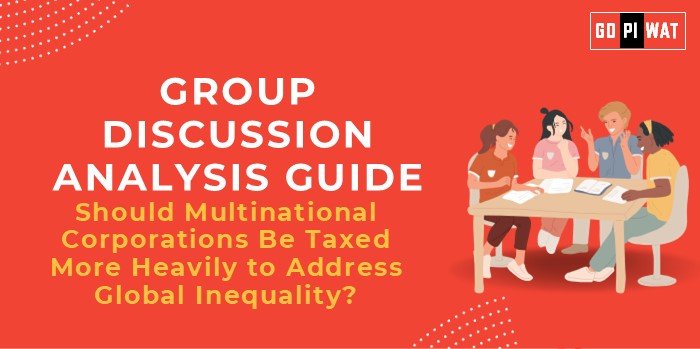📋 Group Discussion Analysis Guide: Should Multinational Corporations Be Taxed More Heavily to Address Global Inequality?
🌍 Introduction to the Topic
- 💡 Opening Context: The question of taxing multinational corporations (MNCs) more heavily is central to the global debate on addressing economic disparities. MNCs, often accused of profit-shifting and tax avoidance, significantly influence global inequality.
- 📜 Topic Background: This discussion gained momentum following the OECD’s 2021 global tax deal, which aimed to establish a 15% minimum corporate tax rate to curb tax evasion. The issue has become increasingly relevant as global inequality widens, with low-income countries receiving a disproportionately smaller share of corporate tax revenues.
📊 Quick Facts and Key Statistics
- 💸 Tax Avoidance by MNCs: $240 billion lost annually due to profit shifting (OECD, 2023).
- 📈 Corporate Tax Revenue Share: High-income countries collect 70% of global corporate tax revenues.
- 🌍 Global Wealth Inequality: Top 1% controls 45.6% of global wealth (Credit Suisse, 2023).
- 🌐 OECD Minimum Tax Rate: Adopted by 136 countries, covering 90% of the global economy.
👥 Stakeholders and Their Roles
- 🏛️ Governments: Implement tax policies and negotiate international agreements.
- 🏢 Multinational Corporations: Pay taxes and lobby for favorable regulations.
- 🌐 Global Organizations: OECD and IMF advocate for equitable tax systems.
- 📢 Civil Society: Highlights tax injustices and pushes for transparency.
🏆 Achievements and ⚠️ Challenges
Achievements:
- ✅ Increased Global Cooperation: The OECD tax framework unites nations for fair taxation.
- 🔍 Improved Transparency: Public country-by-country reporting by MNCs is gaining traction.
- 📈 Enhanced Domestic Revenues: Countries like India and Indonesia have successfully reclaimed lost tax revenue.
Challenges:
- ⚠️ Implementation Gaps: Developing countries often lack resources to enforce new tax regimes.
- 🏝️ Tax Havens: Jurisdictions like Ireland and the Cayman Islands still attract disproportionate profits.
🌐 Global Comparisons and Case Study
- 🇳🇴 Success: Nordic countries collect higher corporate taxes and rank top in the equality index.
- 🇺🇸 Challenge: In the U.S., Amazon paid an effective tax rate of 6% in 2022, well below the statutory 21%.
- 📚 Case Study: India’s Equalization Levy on digital MNCs has generated over $2 billion in taxes since its 2016 implementation.
📋 Structured Arguments for Discussion
- 📈 Supporting Stance: “Taxing MNCs more heavily ensures fairer wealth distribution and strengthens developing economies.”
- 📉 Opposing Stance: “Higher taxes on MNCs may deter investment and stifle economic growth in developing nations.”
- ⚖️ Balanced Perspective: “While higher taxes promote equity, careful design is crucial to avoid unintended economic drawbacks.”
💡 Effective Discussion Approaches
- 📊 Opening Approaches:
- 📈 “The $240 billion lost annually to tax evasion could fund education for 124 million children globally.”
- 🗣️ “Global inequality is not just about wealth but about opportunity.”
- 🔍 Counter-Argument Handling:
- 💬 Highlight successful implementations, such as the OECD’s framework, while acknowledging challenges in enforcement.
🔍 Strategic Analysis of Strengths and Weaknesses
- ✨ Strengths: Increased global cooperation, higher potential revenues.
- ⚠️ Weaknesses: Risk of reduced foreign investments, implementation barriers.
- 🚀 Opportunities: Reduce inequality, fund public services in low-income nations.
- ⛔ Threats: Corporate lobbying, reliance on tax havens.
📘 Connecting with B-School Applications
- 📚 Real-World Applications: Integrating tax policies in finance or economics research.
- 💬 Sample Interview Questions:
- 🔎 “How can developing countries balance foreign investment with higher taxes on MNCs?”
- 🔎 “What role do global organizations play in achieving fair taxation?”
- ✨ Insights for B-School Students:
- 🔍 Explore public-private partnerships in global tax reform.
- 📖 Investigate the economic impact of digital taxation policies.


